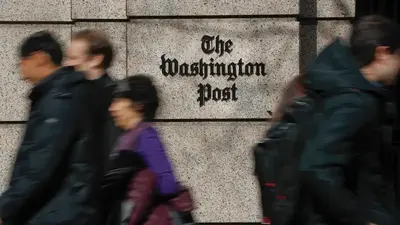Business
Stock market today: US futures point higher in a mixed week of trading and more volatility for banks
Wall Street pointed slightly higher early Friday in a mixed week of trading amid ongoing volatility for some regional banks and the potential for a U.S. recession.
Futures for the benchmark S&P 500 rose 0.3% and the Dow Jones Industrial Average ticked 0.4% higher.
Investors have been on the lookout for the next possible downfall in the U.S. banking industry after three bank failures since March.
PacWest Bancorp rose less than 2% before the bell Friday. A day earlier, shares of the California bank lose another 22.7% of their value after it disclosed a flight of deposits last week. PacWest's tumble on Thursday dragged some, but not all, regional banks down with it.
The banks that failed either had high exposure to tech companies that have been cutting back spending as the Fed raises its benchmark interest rates, or they invested heavily in bonds that are usually safe, but can lose value if interest rates rise.
The Fed has now raised interest rates 10 times, hiking borrowing costs and trapping banks that did not hedge against higher rates when they invested heavily in those bonds.
Helping to limit the losses for the overall market was a report showing U.S. inflation at the wholesale level was a bit cooler last month than economists expected. It followed a report from the prior day that showed inflation at the consumer level was also behaving largely as forecast.
The reports helped reaffirm expectations on Wall Street that the Federal Reserve will hold off on hiking interest rates again at its next meeting in June. That would be the first time that’s happened in more than a year.
A separate U.S. report said more workers filed for unemployment benefits last week than expected. That adds to concerns about a potential recession because the job market has been one of the main pillars propping up the economy.
But a cooling labor market would also carry a benefit for the Fed, which fears that a too-hot job market could put upward pressure on inflation.
Traders are betting on a high probability that the Fed will have to cut interest rates later this year. Rate cuts act like steroids for financial markets but would likely happen only if the economy slides into recession and needs an added boost.
Elsewhere, at midday in Europe France's CAC 40 rose 0.6% in early trading, Germany's DAX added 0.4% and Britain's FTSE 100 inched up just 0.1%.
“Asian equities struggled for direction after weak inflation data in China pointed to weakening demand,” said Stephen Innes, managing partner at SPI Asset Management.
Recent data reflect very low inflation and weak credit extensions in China, which all indicate slowing growth following an initial jump after the nation dropped pandemic-related restrictions, he said.
Japan's benchmark Nikkei 225 gained 0.9% to finish at 29,388.30 as companies like Nissan Motor Co. gained after reporting relatively favorable earnings. But SoftBank Group Corp. slumped after reporting its second year in a row of losses.
Australia's S&P/ASX 200 edged up nearly 0.1% to 7,256.70. South Korea's Kospi dropped 0.6% to 2,475.42. Hong Kong's Hang Seng slipped 0.6% to 19,627.24, while the Shanghai Composite dove 1.1% to 3,272.36.
In energy trading, benchmark U.S. crude rose 33 cents to $71.20 a barrel. Brent crude, the international standard, added 26 cents to $75.24 a barrel.
In currency trading, the U.S. dollar rose to 134.99 Japanese yen from 134.52 yen. The euro cost $1.0888, inching down from $1.0921.
___
Kageyama reported from Tokyo; Ott reported from Silver Spring, Md.
-

 Business32m ago
Business32m agoMarch 2024 insolvency statistics commentary – Mild on the finish of the tunnel however companies should train warning
-

 Business7h ago
Business7h agoGREEN TEA: WELSH FIRM TO POWER KENYA FARMS WITH ELECTRICITY FROM TEA CLIPPINGS
-

 Business9h ago
Business9h agoA Guide for Businesses: From Understanding the Stages of Sales Optimization to Earned Wage Access
-

 Business9h ago
Business9h agoThe Food Allergy Immunotherapy Centre Transitions to “Allergy Centre of Excellence”
-

 Business12h ago
Business12h agoDetailing Manhattan: Christopher Gray’s Legacy – David Brussat
-

 Business12h ago
Business12h agoBusiness Beat: BankNewport supports Kids’ Zone at new Save The Bay Hamilton Family Aquarium
-

 Business22h ago
Business22h agoThe US is one of the least trade-oriented countries in the world – despite laying the groundwork for today’s globalized system
-

 Business22h ago
Business22h agoBiden administration tells employers to stop shackling workers with ‘noncompete agreements’



























